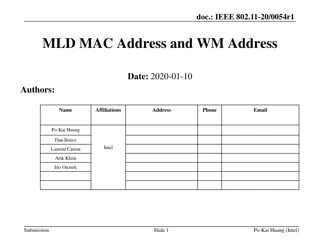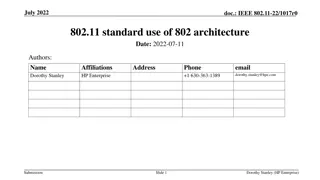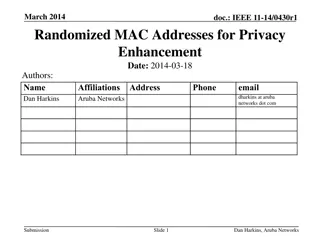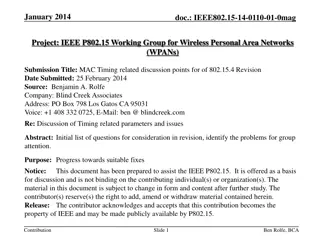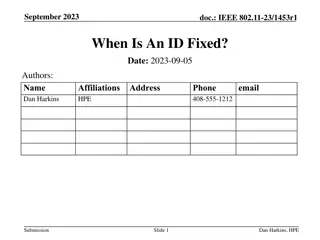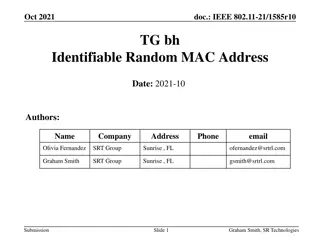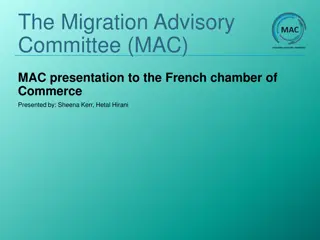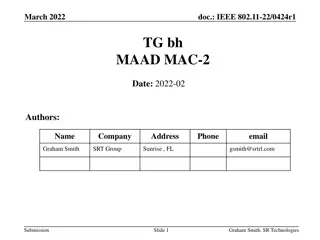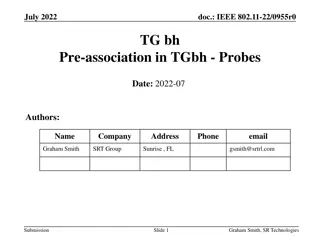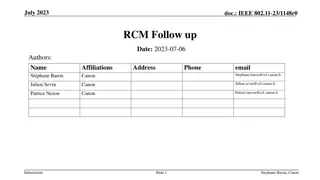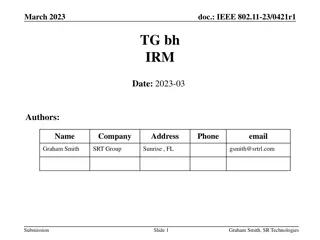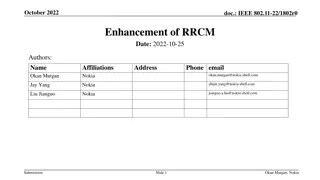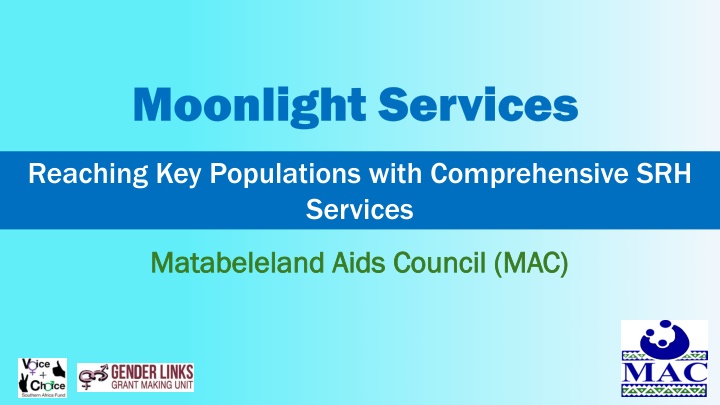
Reaching Key Populations with Comprehensive SRH Services - Matabeleland Aids Council (MAC)
"Learn about Matabeleland Aids Council (MAC) and their efforts to provide comprehensive SRH services to key populations such as sex workers, informal miners, and prisoners. Discover the importance of reproductive health rights and the challenges faced by these marginalized groups in accessing SRHR services."
Download Presentation

Please find below an Image/Link to download the presentation.
The content on the website is provided AS IS for your information and personal use only. It may not be sold, licensed, or shared on other websites without obtaining consent from the author. If you encounter any issues during the download, it is possible that the publisher has removed the file from their server.
You are allowed to download the files provided on this website for personal or commercial use, subject to the condition that they are used lawfully. All files are the property of their respective owners.
The content on the website is provided AS IS for your information and personal use only. It may not be sold, licensed, or shared on other websites without obtaining consent from the author.
E N D
Presentation Transcript
Moonlight Services Reaching Key Populations with Comprehensive SRH Services Matabeleland Aids Council (MAC) Matabeleland Aids Council (MAC)
Presentation Layout 1. About MAC 2. Introduction 3. Background 4. Our Story 5. Lesson Learnt
ABOUT MAC Matabeleland Aids Council is a local Non-Governmental Organization based in Bulawayo and registered as a welfare organization. The organizationn s activities are targeted at reaching out to Adolescent Girls and Young Women, Adolescent Boys and Young Men, adult women and adult men, people living with HIV, Key Populations (mainly focusing on sex workers, informal miners and prisoners. The organizations works with the Ministry of Health and Child Care, Department Of Social Development, Non-Governmental Organization and all other related Government Departments.
INTRODUCTION Key Message: Investment in men and women's reproductive health rights is crucial for empowerment and social development. Definition: Reproductive health encompasses physical, mental, and social well-being in all matters related to the reproductive system and its functions. Importance: Access to reproductive health services allows individuals to make informed choices, impacting their quality of life significantly. Freedom: It includes the ability to have a satisfying and safe sex life, the capacity to reproduce, and the freedom to decide if, when, and how often to do so. Vitality: Reproductive health and rights are essential for well-being, survival, and achieving broader socioeconomic development goals.
BACKGROUND According to the World Health Organization, Sex workers face high levels of stigma and criminalization almost everywhere. Globally, female sex workers are estimated to be 30 times more likely to be living with HIV than other women of reproductive age. In 2019, the Joint United Nations Programme on HIV/AIDS estimated a mean HIV prevalence of 36% among sex workers. Stigma and discrimination has a negative impact in accessing services. Service provider attitudes act as a deterrent to seeking services. Clinic operating hours act as a barrier as they are not key populations friendly. hence the need for a change in strategy in order to offer the needed services to key populations.
PROBLEM Many key populations, such as artisanal miners, truck drivers, and sex workers, face challenges accessing SRHR services due to: Work schedules that conflict with service hours. Unfriendly service providers. Stigma and discrimination.
SOLUTION Matabeleland AIDS Council (MAC) implemented the Moonlight Services model: allows for differentiated service delivery. Evening service delivery when sex workers come out for their work. Peer-led model- making use of peers for demand creation for greater service uptake. Setting up of tents for service provision in a discreet accessible place with experienced KP friendly service providers. One-stop shop for SRHR services: condoms, lubricants, contraceptives, HIV testing both self-testing and provider delivered, PrEP, Sexually transmitted infections screening and treatment. Free service coupons for follow-up at any MAC outreach site.
IMPACT Increased access to SRHR services for key populations. Improved health outcomes. Reduced stigma and discrimination. Greater client satisfaction.
LESSON LEARNT KPs only take up services if a peer does demand creation due to issues of stigma and discrimination. Flexible hours of service result in good service uptake differentiated service delivery. Creating good rapport with the KPs improves trust and uptake of services. One stop shop is ideal as KPs access a number of services under one roof nature of work does not allow for numerous trips to the service provider for different services. Consistency is key having the same providers going for moonlighting builds trust not having to narrate issues to different service providers. The need for SRHR services amongst KPs is high challenge is where and when to access them.


